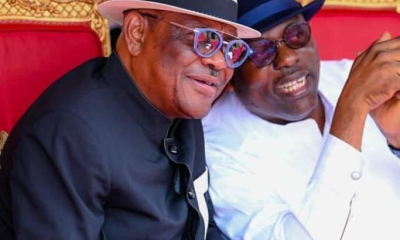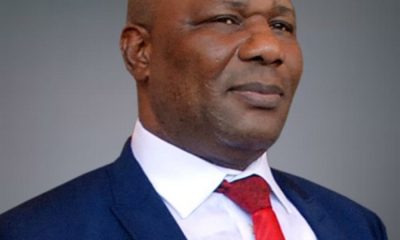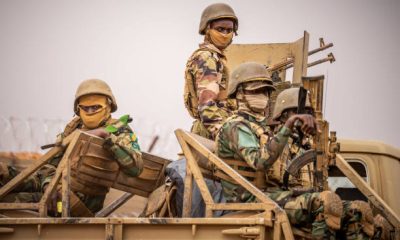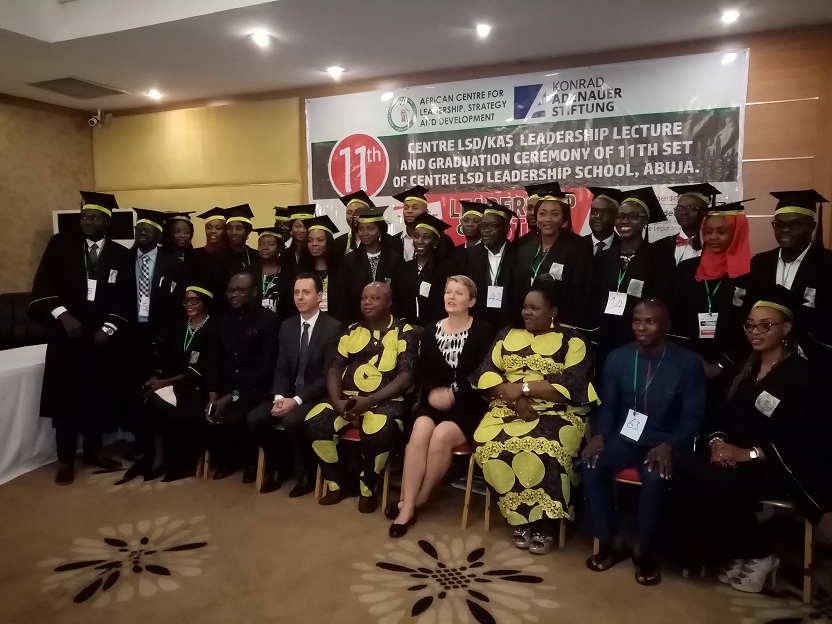view point
Nigeria’s Fading Economic Prospects
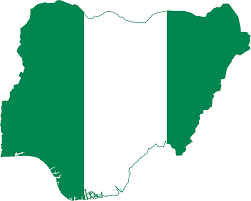
By Dele Sobowale
Late British Prime Minister, Harold Wilson, 1916-1995, was the first to pronounce that “a week in politics is a long time.”
That was long before the world became a smaller global village on account of the internet.
Today, any significant event occurring in any nation on earth is known all over the world within minutes.
The major international networks – Aljazeera, BBC and CNN – were broadcasting the news of the murder of Deborah in Sokoto less than three hours after the mob murder occurred.Nobody needs to be told the image of Nigeria painted by that incident; especially, when it was placed side by side with the report of another attack on the Catholic Bishop’ s Court in the same city.
Federal Government officials who had done a good job convincing the US authorities that Christians were not under siege in Nigeria now watched helplessly as their work was being undone in less than six weeks.
A year is also now a long time in the economic prospects of any country. Decisions made or not made; investments made or not made today in any economy will have repercussions for the people for years to come – for good or ill. The mayhem in Sokoto serves as an appropriate point of departure for the discussion of our country’s economic prospects. Nigerians might not realize it, that incident could not have occurred at a worse time for us.
Globally, the Russia-Ukraine war is already causing a lot of economic re-alignment of business partners and investment/divestment decisions. It is now certain that most of Europe will reduce its trade with Russia and turn their attention to other oil and gas producers. The only oil and gas producer that might not benefit from the economic reversal of alliances is Nigeria. Investors moving away from Russia would not be so rash as to head for a nation experiencing heightened insecurity as Nigeria has become.
Furthermore, many of the long term agreements will be signed within the next one year. Three factors stand against our country right now; and none will disappear in less than a year.
First, we have an out-going government which nevertheless has until May 29, 2023 to go. Investors almost never deal with lame duck governments where long term projects are concerned. Deals would have been completed with other nations by the time a new Nigerian government takes over.
Second, to the best of my knowledge, the Buhari administration has not established a study group to look into the worldwide consequences of the war; how it will affect us and to advise the FG on how our country will escape being a major victim of the Putin War.
Third, Nigerians and our leaders appear not to be concerned about the gradual descent into economic anarchy, such as Sri Lanka is experiencing, which will make the other causes of unrest worse nationally. The announcement made by some Elder statesmen to the effect that there might be no Election in 2023 contains economic dimensions which nobody is addressing. Let me point to one example of opportunity which might be eluding us.
Nigeria Air as Metaphor for Lost Opportunities
“Procrastination is the grave in which opportunity is buried.” Brewer Stock
An Expression of Interest public announcement was published a few days ago by the Federal Ministry of Aviation with regard to the national flag carrier. As an unrepentant advocate of a national carrier, who watched helplessly as time ran out on the project, it was obvious to me that no foreigner would consider the investment now.
Even the most interested would rather wait to deal with a new government – if that government is still keen on Nigeria Air. The thousands of jobs that would have been created, the foreign exchange earned and the skills acquisition are now probably lost for good; or delayed much longer. The Buhari government has also missed out on leaving a legacy. We all lose.
Mismanaged Oil and Gas Resources
“Saudi ARAMCOM becomes world’s most valuable company; worth $2.42 trn.”
When both CNN and BBC reported this feat on the same day, I was happy for the Saudis and sorry for my country Nigeria. Saudi Arabia, despite being the largest exporter of crude oil in the world, has managed to achieve three objectives which have eluded Nigeria since oil was discovered in the two countries.
One, it very quickly ensured that its oil sector was insulated from nepotism which accompanies all political systems – from feudalism to autocracy and democracy. Corruption was minimized and severely punished. Only the brightest and the best people served to manage its divinely provided “golden egg”. Nobody will ever be allowed to crack it; not to talk of breaking it.
By contrast, Nigeria’s NNPC has been a national disgrace. At one time the Nigerian Minister of Petroleum Products was a School Certificate holder; in a country where there were already several world class petroleum engineers. Furthermore, the organization, right from the start, had been a cesspool of corruption. Successive Nigerian leaders and their cabals had treated the NNPC as their own Automatic Teller Machine, ATM. It remains that way till today.
I recently printed out the Auditor General’s report for 2019; which is the latest available. NNPC was, by far, the most indicted government agency. It had the worst record among all the Ministries, Departments and Agencies, MDAs of government. And, its Directors acted with impunity. Undoubtedly, given the history of NNPC, if Nigeria had been blessed with the Saudi’s oil reserves, we might still be languishing in poverty today. As it is, NNPC will never become the most valuable company even in Africa – given the people in charge.
Two, Saudi has ensured that oil is not only produced and exported to the limit permitted by the Organisation of Petroleum Exporting Countries, OPEC, they have installed enough refining capacity to supply all the needs of the people. By contrast, Nigeria now is unable to meet its own quota – on account of few operational rigs and crude oil theft. More disturbingly, we now import every single drop of finished petroleum products. And now, we pay more to import finished goods than what we earn from exports.
Three, in addition to finished petroleum products, Saudi Arabia is supplied with all the other derivatives from crude refining which Nigeria must buy. We have achieved these awful results by allowing something which an American friend and observer called “lunatic” to happen. We have allowed four refineries owned by the NNPC to stay idle for years. They contribute nothing; they guzzle billions.
I know you have heard or read most of these before. But, what you might not have read or heard before is what makes the economic future of Nigeria so bleak; as long as we continue to place our golden egg in the hands of leaders such as we have now. The same American friend who invests in oil and gas disclosed to me that no foreigner will ever build a refinery in Nigeria as long as we continue to demonstrate to them that we don’t want one. We prefer to import. The implications of that statement are grave. Without realizing it, Nigeria will be faced with a monopoly when the Dangote Refinery is completed. But, we all know that any monopoly, however benevolent, can never work in the public interest. That is the verdict of history; which we ignore at our peril.
Obviously, we have messed up our opportunity with crude oil and the way all our governments since Gowon have managed it. Buhari will leave NNPC next year worse than he found it because he and the managers of the sector have no clue regarding what to do next. The next generation of Nigerians will also join this generation as citizens of an oil producing nation living in abject poverty.
This nonsense cannot continue much longer. Mark my words.
Sobowale is an economist, newspaper columnist and public affairs commentator.
view point
Can Tech Solve Talent Shortages Sustainably?

By Juliet Alika
Industries around the world are facing a paradox: talent shortages in key sectors and rising unemployment in others. Developed nations struggle with ageing populations, while emerging markets grapple with youth unemployment. Artificial Intelligence is seen as a potential solution, improving productivity and job matching, but concerns remain about if it can be sustainable and inclusive.
Across industries, employers are having trouble finding the necessary talent at the right time, while millions remain underemployed or excluded.
AI also risks displacing jobs, reinforcing bias, and widening inequality, benefiting developed nations and large firms over small businesses and developing economies. The challenge is ensuring AI addresses labour gaps ethically, inclusively, and in ways that strengthen the global workforce.ManpowerGroup’s 2025 Talent Shortage report reveals that for the first time in 10 years, businesses are reporting a decrease in skills shortages, with 76 per cent of employers reporting difficulty in filling roles due to a lack of skilled talent. The challenge is structural, affecting healthcare, logistics, engineering, and fast-growing digital fields. The global talent crunch is driven by converging forces: skills mismatches as qualifications are becoming irrelevant in evolving market demands, demographic shifts such as ageing populations in developed nations and youth unemployment in emerging economies, changing worker expectations: the desire for flexibility, purpose, and personal growth and the rapid technological disruption transforming job requirements.
As companies scramble to keep pace with rapid change, the demand for future-ready talent is quickly outstripping the capacity of traditional education and workforce development models. What’s needed is investing in lifelong, modular learning that evolves with market needs; leveraging AI to enable dynamic skills mapping and personalised upskilling; strengthening partnerships between industry, education, and government; and expanding access to non-traditional and underrepresented talent pools. Ultimately, solving the talent crunch requires reshaping workforce systems for the jobs of tomorrow.
AI is emerging as a transformative solution to global workforce challenges, offering tools to match, upskill, and mobilise talent. Beyond automating routine tasks, AI enables intelligent talent matching by analysing vast data on candidates, job descriptions, labour trends, and hiring outcomes. It considers hard skills, transferable capabilities, learning agility, and values alignment to deliver more inclusive and efficient hiring. However, this potential requires transparent implementation, bias audits, and integration into human-centred strategies to enhance, not replace, human judgment.
AI also revolutionises personalised upskilling. Traditional one-size-fits-all training no longer meets evolving industry demands. AI-powered learning platforms assess current competencies, identify skill gaps, and deliver adaptive, modular content aligned with individual goals and shifting job requirements. This approach benefits employers by developing internal talent pipelines, reducing reliance on external recruitment, and increasing workforce agility. For employees, especially underrepresented groups, it democratises lifelong learning by making reskilling affordable, flexible, and accessible beyond traditional education barriers. At scale, personalised upskilling fosters resilience, adaptability, and career confidence amid disruption.
Workforce planning and predictive insights represent another critical application. AI leverages predictive analytics to model workforce trends, aligning talent supply with future demand, mitigating economic shocks, and strengthening labour market resilience. By analysing technology adoption, demographic shifts, and economic indicators, AI anticipates emerging skill needs, guiding long-term talent strategies. Policymakers and educators can also use these insights to redesign curricula, improve vocational training, and target upskilling programmes for vulnerable populations.
Healthcare exemplifies how predictive AI can avert crises by forecasting regional shortages of medical professionals, enabling proactive interventions like expanding training capacity or adjusting immigration policies. Similarly, sectors like manufacturing, logistics, energy, and public services can prepare for automation, sustainability transitions, or large-scale retirements through targeted retraining and recruitment strategies.
Economically, AI-driven workforce planning reduces unemployment and job vacancies while supporting sustainable growth. Socially, it creates more equitable opportunities by helping workers prepare for future changes. However, ethical deployment is essential, with safeguards for transparency, fairness, data privacy, and bias mitigation. Ultimately, AI-powered talent matching, personalised upskilling, and predictive workforce planning shift decision-making from reactive to proactive. By combining technology with inclusive strategies, AI can build a more adaptable, equitable, and future-ready global workforce
Artificial Intelligence holds great potential but is not a universal solution, and overreliance poses serious risks. Bias in training data can replicate or worsen inequalities, leading to discriminatory hiring and further marginalising disadvantaged workers. Automation threatens routine and lower-skilled roles, often without generating enough alternative employment. Additionally, digital divides exclude those lacking access, connectivity, or necessary digital skills.
While AI can help address labour gaps, it may also deepen social and economic inequality unless equity, transparency, and fairness are intentionally built into its design, deployment, and workforce integration strategies.
A sustainable AI talent strategy must prioritise people over technology, using AI to enhance human creativity, problem-solving, and decision-making rather than simply replacing jobs. Organisations should invest in tools that foster employee growth, engagement, and continuous learning. Equally vital is building inclusive AI ecosystems through collaboration between developers, HR leaders, and policymakers.
This means ensuring AI systems are transparent, explainable, and fair by auditing algorithms for bias, protecting worker data, and making tools accessible across different languages, abilities, and education levels. Addressing the digital divide is crucial, requiring joint efforts from governments and organisations to expand access to infrastructure, education, and upskilling, particularly in underserved communities.
AI can also support flexible work models: remote, hybrid, or gig-based, broadening access to talent and accommodating diverse needs. However, such flexibility must come with fair pay, safe conditions, and career growth for all workers. Ultimately, a sustainable AI workforce strategy balances technology, equity, and human potential.
AI is a powerful tool, but cannot solve global workforce challenges alone, as talent shortages stem from human challenges of education, inclusion, access and opportunity. A sustainable solution requires integrating AI into a broader strategy for human capital development that prioritises equity, adaptability, and dignity at work. When used responsibly, AI can shift us from scarcity, unfilled roles and disengaged workers to alignment, where everyone has the skills, tools, and support to contribute meaningfully to the economy.
Alika is an experienced human resources and business strategy professional
| ReplyReply allForwardAdd reaction |
view point
Tinubu’s Certificate and Atiku’s Wild Goose Chase

By Tunde Rahman
Former Vice President and roundly defeated presidential candidate, Alhaji Atiku Abubakar, was a pitiful sight to behold on Thursday at the Shehu Yar ‘Adua Centre, Abuja as he sat like a wreck after addressing what he called a world press conference. He had gone on a wild goose chase to the United States in search of President Bola Tinubu’s certificate.
The former vice president however returned empty-handed after spending a fortune.
Atiku himself admitted his exploratory journey was at a hefty cost.At the press conference, the Waziri Adamawa discovered no new thing; he found nothing incriminating or untoward against the President. He is only currently engaging in political sophistry.
Apparently deluding himself that he came back from the US with a smoking gun, at his press briefing, he sermonised on the important issue of leadership and responsibility. Alhaji Atiku assaulted the memory of the late irrepressible lawyer and human rights activist, Chief Gani Fawehinmi, SAN, claiming Fawehinmi inspired his shameful, worthless and self-seeking expedition.Commending David Hundeyin, the rabble rouser who styles himself as an independent journalist, whose work he also said inspired him, it became apparent that both Atiku and Hundeyin were actually working together to embarrass President Tinubu.
Overwhelmed by his inordinate ambition, the failed PDP presidential candidate also shamelessly called traditional, religious, community and political leaders in the country including Labour Party’s Peter Obi and NNPP’s Senator Rabiu Musa Kwakwanso to rally round him in his political vendetta against President Tinubu.“This quest is not for or about Atiku Abubakar. It is a quest for the enthronement of truth, morality and accountability in our public affairs,” he said. And you wonder, what morality Alhaji Atiku was preaching. This is the same man who was indicted in the 2009 conviction of his accomplice, former United States Congressman William Jefferson, over bribery charges. Same man whose principal, former President Obasanjo, wrote a damaging testimonial on and whose years in Customs were signposted by corruption allegations.
If you have not read it, this is what former President Obasanjo said about Wazirin Atiku in Volume 2 Pages 31-32 of his book “My Watch”: “What I did not know, which came out glaringly later, was his parental background which was somewhat shadowy, his propensity to corruption, his tendency to disloyalty, his inability to say and stick to the truth all the time,a propensity for poor judgment, his belief and reliance on marabouts , his lack of transparency, his trust in money to buy his way out on all issues and his readiness to sacrifice morality, integrity, propriety truth and national interest for self and selfish interest.”
It is pertinent at this juncture to clarify some of the issues that emerged from the deposition by President Tinubu’s former school, Chicago State University, in order to understand Atiku’s deliberate and malicious distortion.
Speaking on oath in the testimonies contained in a deposition made in the Office of Angela Liu, Atiku’s legal counsel, in Chicago, US, CSU Registrar, Caleb Westberg declared that President Bola Tinubu attended and graduated with honours from the institution in 1979. He in fact asserted that President Tinubu is the same person who attended the school from 1977 to 1979. “We believe Bola Tinubu who attended CSU is the same person who is the President of Nigeria today. Tinubu is an unusual name in the US. He matched the records in the file against the information provided by the student or on behalf of the student.”
On the insinuation by Atiku’s lawyers that the Bola Tinubu who attended the school was a female on account of a clerical error spotted against Tinubu’s name, Westberg disclosed that the admission letter issued to the Nigerian President evidently proved he was a male and attended the school between 1977 and 1979.
Probed further to confirm if the Tinubu that enrolled at the school was a male or female, the registrar insisted, “Tinubu applied to the university as a male and a letter of admission was issued to a male.
“There were materials in Mr. Tinubu’s records that show he was a male in the application to CSU. Mr. Tinubu identified himself as a male. His letter of admission identified him as a male. It says: ‘Dear Mr. Tinubu’”, he said.
It is relevant to point out that in the US, premium is not placed on certificates, otherwise called diplomas, as we do here. Certificates are merely ceremonial. The emphasis is on transcripts. Employers and schools offering admissions for higher education will only ask for previous transcripts.
In most cases, the certificates are also printed by third party vendors. Many certificates are left uncollected because what is important is the transcript. The CSU has diplomas that students didn’t pick up in its possession.
“I have the diploma that was made available to Mr. Enahoro-Ebah in our possession because Mr. Tinubu did not pick it up. I do not have the diploma that was submitted to INEC in our possession because he had picked it,” Westberg clarified while responding to another question.
Other matters also came up during the over five-hour interrogation session that I do not want to bore you with in this piece. However, it is surprising that Atiku and co would claim President Tinubu forged his certificate simply because the CSU Registrar said he could not authenticate the certificate presented to him by Atiku’s lawyer as the document Tinubu presented to INEC for the 2023 Presidential Election. He said he cannot confirm because only Tinubu has the certificate which he ordered and which had been picked up for him and that the school does not keep students’ certificates. Nowhere in the interrogation did Westberg use the word fake or forged as Atiku’s lawyer tried to make him say so. Fact is there is no scintilla of doubt that President Tinubu attended and graduated from CSU. As my colleague, Temitope Ajayi, pointed out in his widely-publicised tweet, “You can only forge a certificate you never earned.” President Tinubu honourably earned his degree and he had no reason to forge the certificate of a degree he had in his kitty. He graduated Summa Cum Laude, with distinction. He was on the Vice Chancellor’s Honour List for all his years in the school. Insinuation by anyone that he forged a certificate he worked for is sad and misleading.
Indeed, attempts by some to liken the situation with those of the disgraced former House of Representatives Speaker, Salisu Buhari and former Minister of Finance, Kemi Adeosun are disingenuous.
Former Speaker Buhari forged the certificate of Toronto University he never attended. He was removed from office for the forgery. Former President Obasanjo later pardoned him. As for former Minister Adeosun, those who brought her to limelight and sponsored her for the ministerial appointment arranged a fake NYSC exemption certificate for her to scale Senate screening. The same people did her in when disagreements broke out between them, giving her away as a certificate forger over which she eventually resigned. The cases are markedly different: President Tinubu earned his stripes.
In the final analysis, it is yet unclear how Atiku plans to benefit from whatever he claims to have brought back from the US. Certificate forgery was not pleaded in his election petition now at the Supreme Court. Without being a lawyer, this is a civil case and I understand you can’t make new pleas or present new evidence in a case that has passed the court of first instance and is at present on appeal at the Supreme Court.
What the Waziri Adamawa has demonstrated in all of his Shenanigans is that he is a sore loser. Will he gain what he failed to get at the ballot through his present indecent and unpatriotic overseas search and unfounded and hollow discovery, making a mountain where there is even no molehill, unnecessarily heating up the polity and denigrating the Justices of the Supreme Court? I don’t think so!Rahman, former Editor of Thisday on Sunday Newspaper, is a Presidential Aide.
view point
Echoes of New Beginning
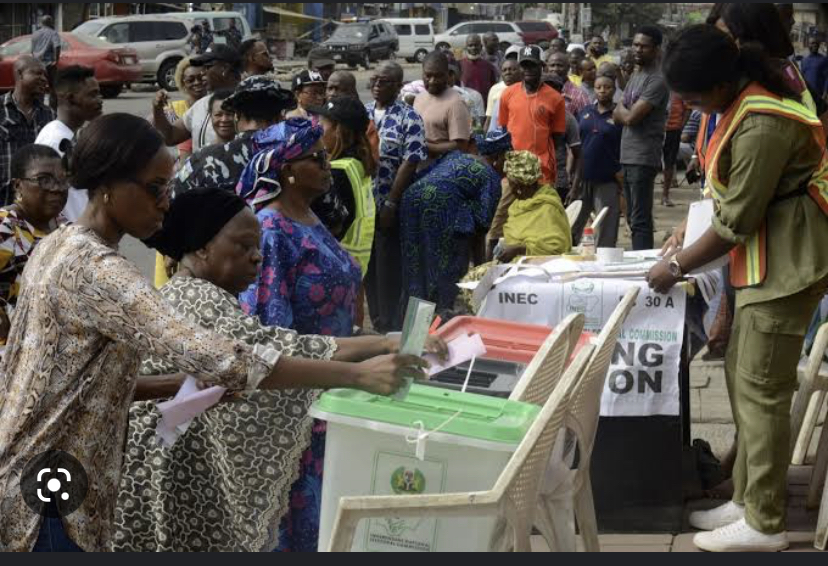
By Dakuku Peterside
Last Saturday’s presidential election marks a new beginning for Nigeria, if not literally, then clearly symbolically. Nigerian voters defied hunger, Naira crisis and appropriated that moment as a clear point of departure from the past. They embraced the election as if their lives depended on it.
The general high level of enthusiasm lifted voter turnout and reinforced confidence in democracy. Young people saw it as a chance to “get back their country”, plagued by bad leadership and underdevelopment. The fanfare and zest with which Nigerians trooped out in their numbers to perform a ritual that may not have rewarded them in the past but still managed to sustain their hope of a better future was electric. The presidential election revealed a divided, disillusioned, and disaffected Nigeria. Despite whatever will be the election’s outcome, most Nigerians believe the electoral process is a radical improvement on previous exercises, considering the size and complexity of the country. Previous polls have been anticlimactic both in process and outcome.Nigerians hope that this election will usher in a genuine democratic leader that represents the choice and voice of the people. The elections were generally peaceful and orderly, save for pockets of skirmishes in flashpoint states where thugs disrupted the polls, carted away ballot boxes, or tactically disenfranchised voters.
Regrettably, bad habits of thuggery and violent disruptions of the process resurfaced. Blatant violent hooliganism in states like Kogi, Lagos and Rivers overwhelmed security arrangements.
According to media reports and from the account of observers, youths turned out in their numbers to vote. Voters’ turnout from observation, in general, may be better than in the recent past, where voter apathy was prominent, and there was a continuous decline in the number of voters in each subsequent general election. Most persons who observed the polls I have spoken to are cautiously optimistic that it would be a relatively free and fair election, thanks to the recent amendment of electoral act which gave legal backing to Bimodal Voter Identification System ( BVAS) and other technological devices. From snippets of results, old political fiefdoms seem to be crumbling. Nigerians have rejected politics of hate, violence, and intolerance. If this is the case, it will mark a watershed in the political history of Nigeria.
Discerning persons must have observed four different echoes and reverberations with the elections. The first echo is that INEC prepared better this time around when compared with previous elections. The level of the organisation before and during the polls shows an improved INEC operation. INEC carried out voter sensitization, conducted mock exercises and reasonably assured the public of its best intentions . The use of technology was good, as voters can even find their polling units online. The identification method in polling units was remarkable, and we must commend INEC for even using the technology in remote parts of Nigeria. The BVAS technology generally worked, with failure in few places. Overall, the quality of the election conducted has improved. This evidences that Nigerian institutions can work if we are ready to do the work required to improve them.
However, there is also an elixir of mixed feelings about INEC’s preparation for this election. INEC allowed many familiar slip ups in logistics. Backup batteries for BVAS devices were not available in most places. INEC staff turned up late in a number of places. Voting started late or did not even take place in isolated instances. But given the tripartite problem of cash scarcity, fuel scarcity and infrastructural deficiency, one can only imagine the enormous challenge of organising this election in almost one hundred and seventy seven thousand polling units nationwide. Given the recurring logistics challenges in our elections, INEC must develop better ways of solving these problems to improve Nigerians’ voting experience. It is unfair that voters turned out to vote and either did not see INEC officials or the officials came late.
This lead to some voters being disenfranchised completely, or voting spills over to the following day. Besides, INEC officials could not upload the results from the polling units. This is a critical low point of the elections. Electoral fraudsters will probably “doctor” the results to their advantage — the same complaint all over the Federation.
The second echo is the high turnout of youth voters. Traditionally, Nigerian youths are dispassionate with politics and the electoral process. This was a shame, given that they comprise a more significant part of the population. In previous elections, voter apathy among youths was high, and most young people would rather be doing anything else than queue to vote in elections. Previous election post- mortem analyses often lambast youths’ lack of interest in the electoral process. The number of young people engaged in this election is remarkable and marks a departure from the old. The overwhelming youth turnout reinforced the future as the domain of youth.
This is significant in three ways: first, it may be a sign that the youths have suddenly realised that they have a part to play in selecting the country’s leaders. Youths’engagement in social media has made them adept at sharing their political views and championing political ideas. The second is that this large turnout signifies rebellion against orthodoxy. Young people are dissatisfied with the status quo and have decided to influence their future through political mobilisation and participation. Students of political sociology may need to chart the youth’s political consciousness through the various conflicts between the young people and the system (institutions, agencies, government), as seen in the ENDSARS revolt and other pro-youth agitations. These movements have crystallised in youth political advocacy. The third is that the large turnout of youths signifies their willingness to use their strength in number to take back political control from older leaders who have captured power in Nigeria for a generation. We hope that the extension of this considerable youth turnout in the next few years will signpost the young presenting themselves in more significant numbers to be voted for and metaphorically taking back their country.
The third echo is that many Nigerians have started demonstrating faith in the electoral process.
There was also a higher than usual awareness of democratic rights as voters strongly pressed their rights and opposed those out to violate those rights. The level of political awareness is encouraging and remarkable . The mantra in this election has been that “your vote counts”, and with the new voting technology, election rigging is brought to a minimum. This has inspired confidence in many people to vote. This will deepen our democracy and its corollary good governance in Nigeria. It is also significant to note that this is the first election since 1999 where none of the presidential aspirants came from the military. Nigerian democracy is gradually growing away from the control and influence of the former military generals who captured power and have defined our politics for over fifty years. Nigerians in this election have demonstrated their love for democracy and are willing to participate when they believe in the process. I hope that subsequent actions and inactions of the political gladiators and institutions post- election will be democratic. The calling of the election result, the declaration of victors, the litigations and appeal routines, the transition process and forming of the new government are all flashpoints that must be followed with caution and due democratic tenets to sustain the democratic bubble this election has created.
The fourth echo is that Nigerians want a new Nigeria and are full of new expectations from the incoming president. The new leadership faces high expectations from Nigerians who believe we are at the breaking point and things are no longer at ease. Nigerians expect the president-elect to chart a new course for the country towards economic, technological, social, and political regeneration that will improve the living standard of Nigerians. Nigerians are tired of suffering and living in the hope of a better Nigeria which honest leaders can build from our endowments. Whoever emerges as the president has his job cut out and must quickly act before Nigerians lose their patience. Whoever is declared victorious has no option but to embark on radical reforms on all fronts. He must initiate policies and programs that address youth concerns, particularly education, employment creation, insecurity, infrastructure, and good governance.
There is no doubt that Nigerians, both at home and abroad, are expecting a new and better Nigeria going forward. The election has sent echoes reverberating across time and space for a new beginning—a fresh start for more incredible things. Building the Nigeria of our dreams is a task for all and getting the leadership right is the first step towards achieving a greater Nigeria. We must continue with the passion and optimism of the election and put them to better use in productivity and innovation. I hope our youths are awake and in tune with the realities of our time. The future is for them, and they must work hard to build it. Economic and political participation is necessary for such growth. I implore all Nigerians to dare to dream of a better, greater, and prosperous Nigeria.
Dakuku Peterside is a policy and leadership expert.






